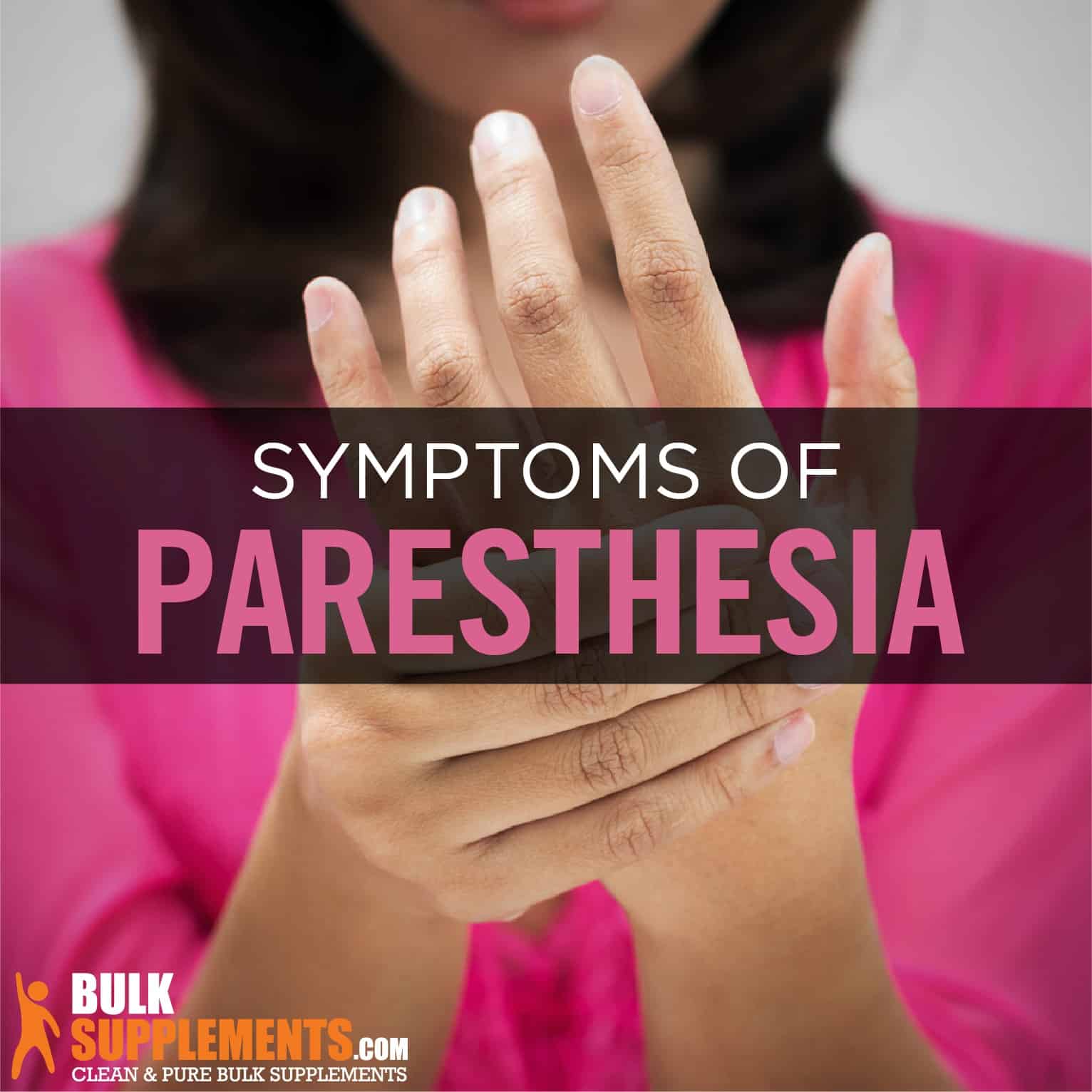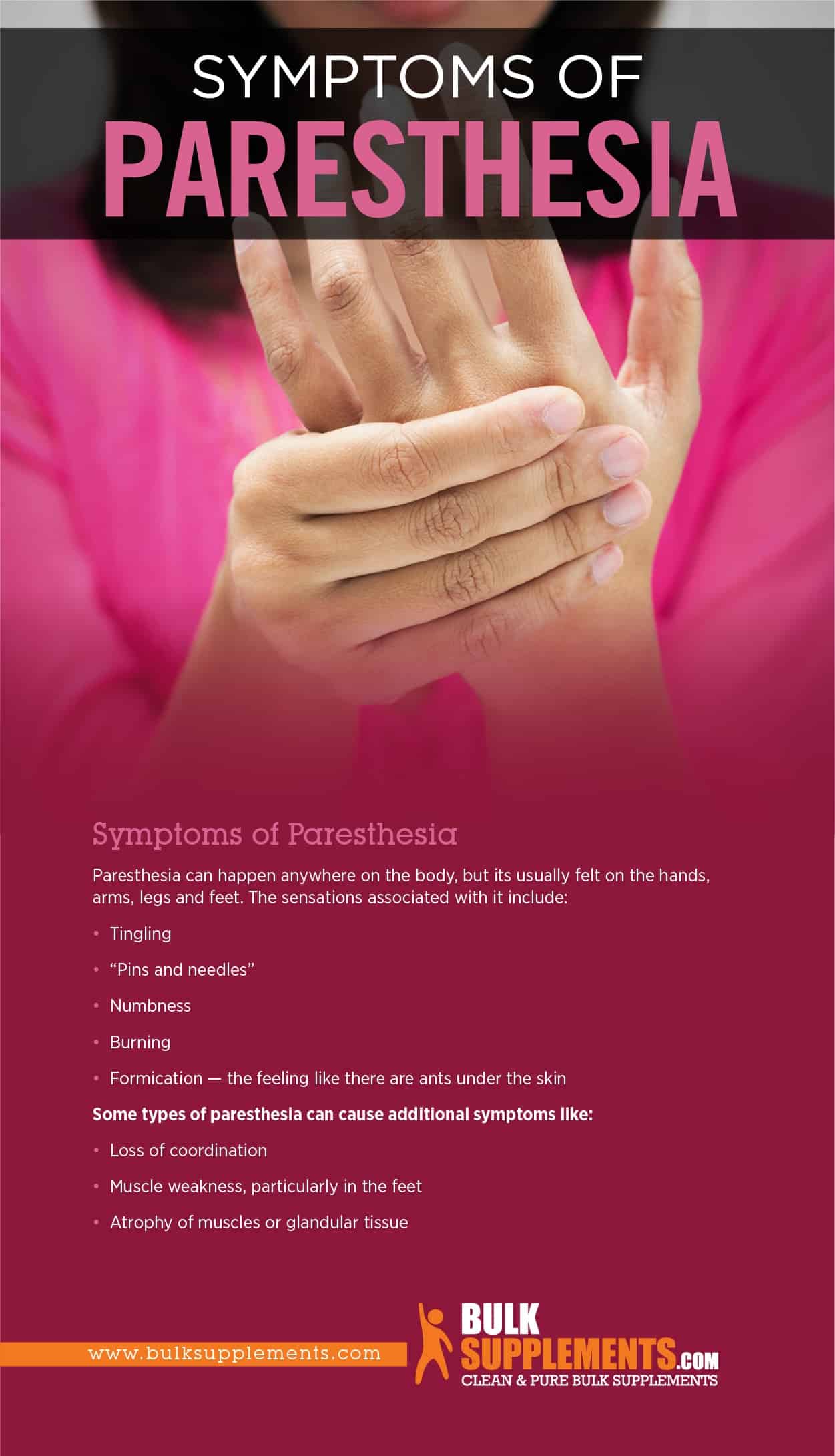Paresthesia: Symptoms, Causes & Treatments
by James Denlinger Digital Marketing Strategist
What is Paresthesia?
Paresthesia refers to an abnormal feeling on the skin such as numbness, tingling, pricking or the “pins and needles” sensation. Often this feeling is just temporary and is no cause for concern.
Have you ever slept on your arm and woken up with it numb? Or sat cross-legged for extended periods of time only to need a moment to get feeling back in your feet? That’s paresthesia.
However, it can arise from other underlying conditions and become more chronic and problematic. For example, neurological disorders or injury to one part of the body can cause paresthesia to persist.
Temporary paresthesia generally resolves on its own. When it’s chronic, however, getting to the root of the cause is necessary to determine the best way to treat it.
Symptoms of Paresthesia
Paresthesia can happen anywhere on the body, but its usually felt on the hands, arms, legs and feet. The sensations associated with it include:
- Tingling
- “Pins and needles”
- Numbness
- Burning
- Formication — the feeling like there are ants under the skin
Some types of paresthesia can cause additional symptoms like:
- Loss of coordination
- Muscle weakness, particularly in the feet
- Atrophy of muscles or glandular tissue

Causes of Paresthesia
An abnormality that occurs anywhere on the sensory pathway between the peripheral nerves (the ones outside of your brain and spinal cord) and the sensory cortex (the part of the brain that receives and interprets sensory information from the rest of the body) causes paresthesia.
But besides things like simply falling asleep in a strange position, what can cause this? The causes of chronic paresthesia can fall into three subcategories — peripheral neuropathy, radiculopathy and issues related to the central nervous system.
Peripheral Neuropathy
Peripheral neuropathy, a type of paresthesia, occurs when there’s a disturbance — usually some type of damage — within the nerves of the hands, feet, legs, arms, face or torso. Many underlying medical conditions can cause this. These include:
- Physical injury
- Autoimmune diseases like multiple sclerosis and lupus
- Diabetes
- Nutritional deficiencies or imbalances, such as not enough B12 or too much B6
- Alcoholism
- Hormonal imbalances
- Some medications
- Tumors that press against nerves
- Carpal tunnel syndrome
Radiculopathy
Radiculopathy is a lot like peripheral neuropathy, but happens when tissue swells around the root of a nerve (the spot where the nerve originates). This is also commonly called a “pinched nerve” and can occur along different areas of the spine. Bone spurs, carpal tunnel syndrome and sciatica are examples of a type of radiculopathy.
Central Nervous System (CNS)
Parasthesia can also result from problems with the CNS. Strokes, encephalitis (swelling of the brain) and even some of the previously mentioned autoimmune disorders like multiple sclerosis can cause abnormal skin sensations originating from the CNS.
Treatment for Paresthesia
Treatment for paresthesia depends on the underlying cause. Addressing nutritional deficiencies, managing an autoimmune disease or surgically addressing a pinched nerve in the spine are examples of ways to relieve chronic paresthesia. Your medical team can advise you of treatment options based on your particular case.
Supplements for Paresthesia
Vitamin D
While too much vitamin D can be an underlying cause of parasthesia, those with a vitamin D deficiency may find improvement in neuropathy symptoms by taking a supplement. If you’re experiencing chronic paresthesia and/or neuropathy, it’s best to get your vitamin D levels checked by a doctor to see if you are getting too much or could benefit from a little more. To take vitamin D3 for neuropathy, ask your doctor what dose is right for you. Vitamin D3 is highly toxic in higher amounts. Because of how concentrated this supplement is, be sure to measure and consume it with care. Do not supplement this product if you do not have an accurate milligram scale.
Magnesium
This important mineral has many roles in the body and helps with healthy nerve impulse control. Those more at risk for paresthesia, such as people with diabetes type 2 or who drink a lot of alcohol, also tend to be most at risk of magnesium deficiency. As a result, supplemental magnesium may help relieve symptoms of paresthesia and neuropathy. Supplements come in many forms like magnesium citrate, magnesium oxide and magnesium carbonate. Follow label directions or your doctor’s instructions for whichever product you choose.
Vitamin B12
Vitamin B12 deficiency can cause paresthesia. This is because B12 plays a large role in the proper functioning of the nervous system. Some signs of a B12 deficiency include tingling in the hands and feet or soreness in the mouth and tongue. Those most at risk for a deficiency include vegetarians and vegans (since B12 in food comes from meat) and people who have had stomach surgery or have malabsorption issues. As a supplement, take in servings of 100 mg or 200 mg once per day or as recommended by your doctor.
Folic Acid
Folic acid is also known as vitamin B9. It’s found in foods in the form of folate and is important for a healthy nervous system. A folic acid/folate deficiency, especially combined with low B12, could cause paresthesia. As a supplement, it is recommended that individuals take no more than 500 to 1,000 micrograms of folic acid daily. Do not exceed 1,000 mcg. Pregnant women should limit intake to take 300 to 400 mcg per day. Since individual needs will vary, it is important to consult a physician prior to supplementation. An accurate microgram scale is required to measure out this supplement.
Alpha Lipoic Acid
Studies show that the antioxidant properties of alpha lipoic acid can help reduce nerve damage associated with conditions like type 2 diabetes and carpal tunnel syndrome. It can be found in a wide range of foods like red meat, spinach, broccoli and tomatoes and is also available as a supplement. It is recommended that ALA be taken at a dose of 600 mg once or twice daily with meals, depending on the intended effect. Do not to take too much at once, as this might cause imbalanced levels of ALA.
The Bottom Line
Paresthesia itself is not dangerous, but causes clumsiness and a loss of coordination that can lead to falls and other accidents. Most of the time it’s a temporary result of pressure being placed on a nerve. However, paresthesia and its related neuropathy can signal a much more serious underlying problem. Uncovering the cause of chronic paresthesia is the only way to know how to properly treat it. Meanwhile, supplements like magnesium, vitamin D, B12, folic acid and ALA can help keep the nervous system as healthy as possible.
Sponsor Ads
Created on Mar 4th 2020 13:01. Viewed 492 times.



